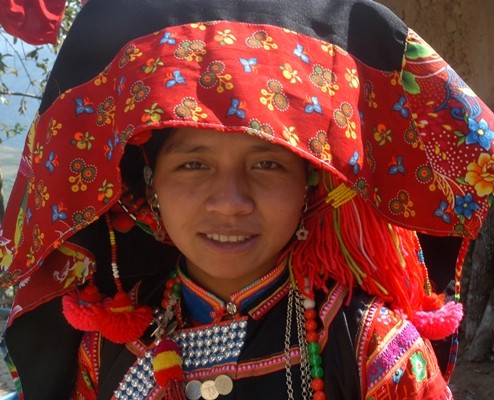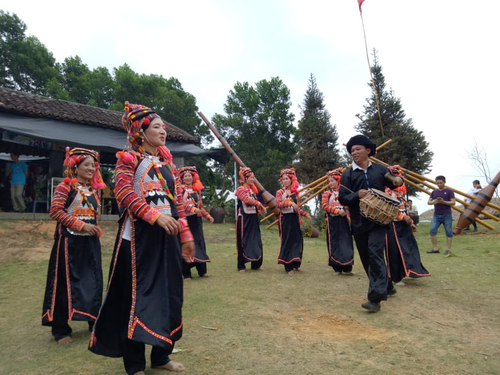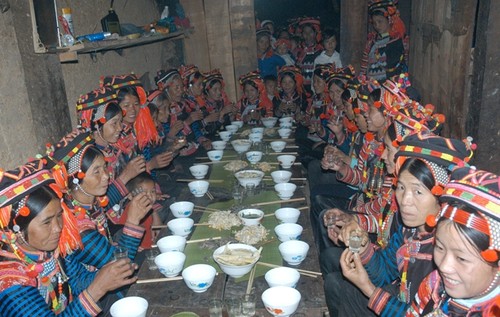 A Ha Nhi bride. (Photo: baotintuc.vn) A Ha Nhi bride. (Photo: baotintuc.vn) |
Ma Ly Pha from Muong Te district is playing the la khu, a traditional musical instrument of the Ha Nhi people. It is made from half of a dried gourd and 6 strings. With dancing fingers, Pha is sending a loving message from a man to his woman.
"Traditionally, parents would decide who their children could get married to. If we loved someone but they didn’t approve, we couldn’t marry them. We figured out a way to send messages to our beloveds by playing the instrument and singing lyrics like ‘I love you, if you’re inside, please come out with me.’ If they felt the same way about us, they would come out,” he said.
Ha Nhi men propose with la khu, and Ha Nhi women also have their own way of expressing their feelings. Sung Go Nhu from Muong Te district said: “There are two kinds of traditional flutes here: la puy and puy. Puy is usually played at night for the man or woman to wake his/her beloved up. The melody sounds like a call, which says: ‘Darling, can you hear me? I’m playing the flute to call you. Are you asleep or awake? If you’re awake, please come outside to me.’ If they love each other, they can feel the music.”
Ha Nhi women can freely express their feelings towards men. For some shy girls, they do it by playing musical instruments. For outgoing women, they can say it directly to the man. But in some cases when the couples fail to receive blessings from their families, the woman can run away with her beloved.
“My aunt and uncle loved each other very much but my aunt’s mother opposed that love. So she decided to run away to my uncle’s home. If we step into the man’s home, it means we have become part of the family. No one can force us out,” said Sung Go Nhu.
The runaway usually takes place at night. Sometimes the man’s parents are alerted in advance, sometimes they’re not. But they still accept the woman as their daughter-in-law. No wedding is required. The couple can have children then organize a small ceremony at the wife’s side of the family as an official recognition of their marriage.
 A traditional dance of the Ha Nhi ethnic people. (Photo: VOV) A traditional dance of the Ha Nhi ethnic people. (Photo: VOV) |
If both the man and woman get blessings from their families, the man’s side will perform a pre-wedding ceremony. Their betrothal gifts include eggs, a bottle of wine, and sticky rice.
“The wine represents the couple’s love. And the sticky rice reflects the hope that the couple will stick together for a long time. The offerings will be given to the bride’s mother. On this occasion, the groom will call her ‘mother-in-law’ to erase any distance between them,” Ma Ly Pha explained.
Before the official wedding, Ha Nhi people have three pre-wedding ceremonies. The first one is to discuss the wedding date. At the second , the groom’s family will offer money to the bride’s side. If the bride has brothers, each of them will in turn request higher amounts of money, and the final number will be the highest one because it means the newly-wed couple will gain more and more money during their marriage. If the groom’s side accepts the request, they will not give all the money to the couple at once but save a little for the last pre-wedding ceremony. It’s intended for the bride’s parents as a way to thank them for giving birth to the bride and raising her.
After giving money three times, the groom’s family is no longer allowed to give the couple any more. Even if they do, the bride’s family will not accept it.
“The money is for food, livestock, and people. We must not give any extra from the fixed amount that both families have agreed upon, as the bride’s family is sending her off, not selling her off. After she dies, her body and soul still belong to her parents, not the in-laws,” Ma Ly Pha elaborated.
On the wedding day, the groom’s family arrives at the bride’s house with betrothal gifts. The bride’s mother is already waiting for them at the door.
“The bride’s mother stands at the door and sings to tell others that this is her son-in-law. The groom’s family can only enter the house after the mother finishes singing lyrics like ‘This is my son-in-law. I wish him and my daughter happiness and longevity. I hope they’ll get along well,” Sung Go Nhu explained.
 Relatives and friends gather at a Ha Nhi wedding party. (Photo: baotintuc.vn) Relatives and friends gather at a Ha Nhi wedding party. (Photo: baotintuc.vn) |
After the groom’s family delivers the betrothal gifts, the bride’s side will perform a custom called “money scaling”. “This is only symbolic as any amount of money is acceptable," said Ma Ly Pha, "There are two scales on each side. If the groom’s family put money on one end and say ‘too much, too much’, the bride’s will raise the scale at the other end and say ‘too little, too little’. It creates a fun and exciting atmosphere for the wedding. It also means we wish that the couple will achieve whatever they want in the future.”
On the wedding day, the bride’s brother will carry her outside on his back and take her to the groom’s house. It reflects the brother’s respect for his little sister. Ha Nhi people believe that to see the bride off, her family must outnumber the groom’s. It means there will be more luck and blessings for the couple. To wish for a happy marriage, Ha Nhi people are very careful on their wedding day. There are some taboos that must be avoided, according to Sung Go Nhu.
“If we come across any animal on the way, we mustn’t hit them. The bride’s family must bring along sticky rice and an egg so that if they pass a stream, they will have to take them out and pray that bad luck will not follow them and for the bride to get to her husband’s home safe and sound,” said Nhu.
“During the wedding, no dog is allowed to pass by, as it is considered bad luck," Ma Ly Pha said, "But, it depends on the situation. Further customs can be employed to combat the bad luck of a passing dog, if it proves unavoidable.”
The groom’s mother is also waiting for her daughter-in-law at her door with blessings that luck will come their way. A white thread is tied to the door; the bride and groom each grab one end and pull it. Two chickens are released to run through the door, which means all troubles will go away and not bother the couple anymore.
After the wedding, the newly-wed couple pick a date to visit the bride’s family. The gifts are simple, just a bottle of wine and a pack of sticky rice. There, the groom must slaughter the chicken himself.
“The bride’s family can only test the groom after the wedding, because then he already is part of the family. If he makes any mistake, the family must teach him so that in the future the bride can depend on himfor. Before, we also had various rules for the bride, such as getting up early to prepare breakfast for parents-in-law, or not sitting at the same table with parents or uncles, and brothers-in-law. But now, things are much less strict, as long as the bride and groom have respect for their parents,” Ma Ly Pha explained.
The rules and wedding rituals reflect the Ha Nhi people’s beliefs and their wish for a happy marriage. It also expresses the respect for traditions and ancestors that they want to pass down to future generations.